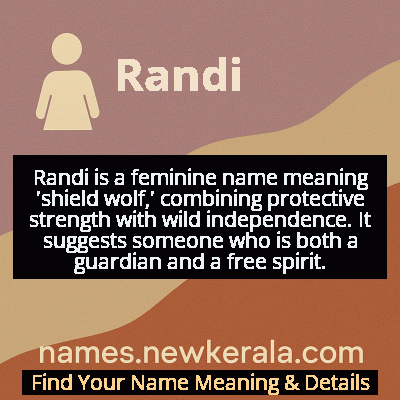Randi Name Meaning & Details
Origin, Popularity, Numerology Analysis & Name Meaning of Randi
Discover the origin, meaning, and cultural significance of the name RANDI. Delve into its historical roots and explore the lasting impact it has had on communities and traditions.
Name
Randi
Gender
Female
Origin
Anglo
Lucky Number
1
Meaning of the Name - Randi
Randi is a feminine name meaning 'shield wolf,' combining protective strength with wild independence. It suggests someone who is both a guardian and a free spirit.
Randi - Complete Numerology Analysis
Your Numerology Number
Based on Pythagorean Numerology System
Ruling Planet
Sun
Positive Nature
Leaders, ambitious, highly driven, self-reliant, innovative.
Negative Traits
Overly aggressive, domineering, impatient, selfish.
Lucky Colours
Red, orange, gold.
Lucky Days
Sunday.
Lucky Stones
Ruby, garnet.
Harmony Numbers
2, 3, 9.
Best Suited Professions
Entrepreneurs, managers, engineers.
What People Like About You
Courage, determination, leadership.
Famous People Named Randi
Randi Weingarten
Labor Leader
Long-serving president of American Federation of Teachers and education advocate
Randi Oakes
Actress
Television star known for her role in CHiPs and modeling career
Randi Zuckerberg
Entrepreneur
Technology executive and founder of Zuckerberg Media
Randi Rhodes
Radio Host
Nationally syndicated political commentator and talk show host
Name Variations & International Equivalents
Click on blue names to explore their detailed meanings. Gray names with will be available soon.
Cultural & Historical Significance
In Scandinavian cultures, particularly Norway, Randi has deeper historical roots as a traditional feminine name derived from Old Norse elements. Here it carries different connotations, often associated with strength and beauty in Norse mythology and folklore. The dual cultural heritage gives the name a unique position - representing both modern American innovation in naming conventions and ancient Scandinavian tradition. This cultural duality makes Randi particularly interesting as it bridges old-world heritage with new-world reinvention.
Extended Personality Analysis
Women named Randi are often perceived as strong-willed, independent, and resourceful individuals who combine protective instincts with a fierce sense of autonomy. The 'shield wolf' etymology suggests someone who is both a guardian and a free spirit - capable of deep loyalty to loved ones while maintaining their own strong identity. This duality often manifests as practical problem-solving ability coupled with creative thinking, making Randis adaptable in various situations and respected for their balanced approach to challenges.
Socially, Randis tend to be outgoing and charismatic, with a natural ability to lead while remaining approachable. Their personality often blends traditional values with progressive thinking, reflecting the name's historical roots and modern usage. They're typically seen as reliable friends and partners who offer both emotional support and honest advice. The wolf symbolism suggests intuition and strong family bonds, while the shield element indicates a protective nature that makes others feel safe in their presence. This combination creates individuals who are both strong anchors and inspiring leaders in their communities.
Modern Usage & Popularity
In contemporary times, Randi has evolved from its peak popularity in the 1970s to become a less common but still recognizable name. It currently ranks outside the top 1000 names in the United States, making it a distinctive choice for parents seeking a familiar yet uncommon name. The name maintains its association with strength and independence, appealing to modern parents who value these qualities. While its usage has declined since its mid-century popularity, it continues to be chosen by parents attracted to its strong phonetic qualities and gender-neutral potential, though it remains predominantly feminine in current usage patterns. The name's Scandinavian roots also give it appeal among families celebrating Norse heritage or seeking names with international flair.
Symbolic & Spiritual Meanings
Symbolically, Randi represents the harmonious balance between protection and freedom, drawing from its 'shield wolf' meaning. The shield symbolizes defense, security, and steadfastness - qualities of a protector who creates safe spaces for others. The wolf represents wild wisdom, intuition, and strong family bonds, suggesting someone deeply connected to their instincts and community. Together, these symbols create a powerful metaphor for modern femininity: strong yet nurturing, independent yet loyal, fierce yet compassionate. The name embodies the idea that true strength includes both the courage to protect and the wisdom to know when to roam free, making it symbolically rich for representing complex, multifaceted individuals.

